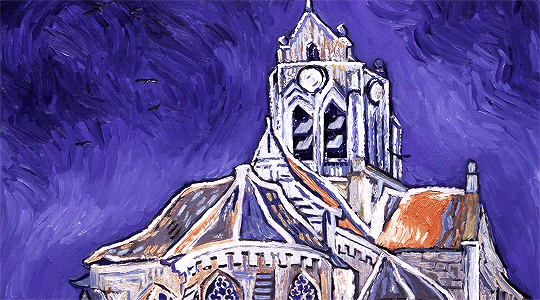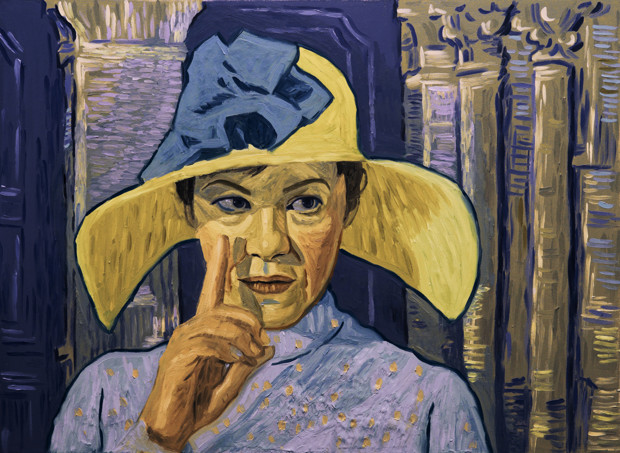
Brief Overview
The Expectancy-Value Theory is made up of two components that make up motivation: expectancy and value. These two variables play an important role in predicting an individual's future decisions, persistence, involvement, and achievements.
→Expectancy
∟an individual's belief in their capabilities and expectations for success
∟"Can I do this task?"
→Value
∟an individual's personal goals, reasons, incentives
∟it's the importance of worth in doing certain tasks
∟"Why do I want to do this task?"
 His Determination
His Determination
Expectations can come with heavy disappointment. Armand Roulin wasn't entirely sure how the outcome of his journey will end. Did he expect to find the answers he needed to solve this cold case? Would finding the truth provide solace? But to whom? Himself?
The boatman had told Armand to speak to Gachet's daughter, Marguerite Gachet, who seemed to have a strange relationship with Vincent. Adeline Ravoux from the Ravoux Inn only confirmed Armand's suspicions when she pointed out that their close relationship would make sense of Gachet's daughter bringing flowers to his grave every day and that the doctor and him had an argument the day before he died. He rushed off to meet with the housekeeper Louise Chavelier again, who goes to church on her afternoons; she had not problem badmouthing the artist before Armand could question her.
 Once he knew the housekeeper was kept away from the manor, he rushed off to confront Marguerite. She expected him to come see her; she was intuitive, knowing he had questions that needed to be answered, but danced around the conversation. He told her he wanted to do something for Vincent, but why he felt the need to do so was unclear. She evaded Armand's interrogative statements until he made implications about the argument Vincent had with her father which resulted in his suicide. Angered, she denied this accusation.
Once he knew the housekeeper was kept away from the manor, he rushed off to confront Marguerite. She expected him to come see her; she was intuitive, knowing he had questions that needed to be answered, but danced around the conversation. He told her he wanted to do something for Vincent, but why he felt the need to do so was unclear. She evaded Armand's interrogative statements until he made implications about the argument Vincent had with her father which resulted in his suicide. Angered, she denied this accusation.
Although his expressions lack proof of optimism, he does expect to find answers and he believes that he has some capabilities in asking the right questions to the right people. His self-efficacy is rather strong although he isn't entirely sure if the outcome he desires will come true. Because he certainly has the skills to attain it; he is determined and persistent. Armand may find value in gathering information to find the truth, but what value will he gain from knowing? He isn't quite sure himself. It could be to do right by him because he only knew the artist as a crazed man. His feelings of remorse and guilt may play a role in his particular behavior.



The Expectancy-Value Theory is made up of two components that make up motivation: expectancy and value. These two variables play an important role in predicting an individual's future decisions, persistence, involvement, and achievements.
→Expectancy
∟an individual's belief in their capabilities and expectations for success
∟"Can I do this task?"
→Value
∟an individual's personal goals, reasons, incentives
∟it's the importance of worth in doing certain tasks
∟"Why do I want to do this task?"
M(motivation) = E(expectancy) x V(value)
To put it simply, if an individual has high expectancy and high value, then it will result in high positive motivation. If both variables are low, then it will result in no motivation. If one variable is high and the other is low, then motivation may vary.Expectations can come with heavy disappointment. Armand Roulin wasn't entirely sure how the outcome of his journey will end. Did he expect to find the answers he needed to solve this cold case? Would finding the truth provide solace? But to whom? Himself?
The boatman had told Armand to speak to Gachet's daughter, Marguerite Gachet, who seemed to have a strange relationship with Vincent. Adeline Ravoux from the Ravoux Inn only confirmed Armand's suspicions when she pointed out that their close relationship would make sense of Gachet's daughter bringing flowers to his grave every day and that the doctor and him had an argument the day before he died. He rushed off to meet with the housekeeper Louise Chavelier again, who goes to church on her afternoons; she had not problem badmouthing the artist before Armand could question her.
"I could see the fever in his eyes [...] always skulking about, gobbling our food, just making messes in corners."

Although his expressions lack proof of optimism, he does expect to find answers and he believes that he has some capabilities in asking the right questions to the right people. His self-efficacy is rather strong although he isn't entirely sure if the outcome he desires will come true. Because he certainly has the skills to attain it; he is determined and persistent. Armand may find value in gathering information to find the truth, but what value will he gain from knowing? He isn't quite sure himself. It could be to do right by him because he only knew the artist as a crazed man. His feelings of remorse and guilt may play a role in his particular behavior.
"All seemed fine with him. I mean something must've happened pretty suddenly for him to become unbalanced."

Once Armand returned back to the Ravoux Inn, Adeline shared new information about Vincent concerning the last few days before he had died. Theo van Gogh had provided Vincent for his paint supplies and perhaps argued about money. What was peculiar was that Vincent had sent Theo a letter requesting for more paints the day before he died, which didn't add up to his death.
She provided one more piece of information, a letter Vincent had written to Theo the day he arrived in Auvers-sur-Oise. Aside from the letter Armand has to deliver, this was physical proof of Vincent's existence. He was unsure of whether or not to read the letter, but that evening Armand was booked to stay in the same room Vincent had lived in as well as died in. The thought left him feeling in some kind of way as he decided to read the letter. He woke up in a fright from a paranormal dream and went out for a smoke. A figure in the dark antagonized him and ran after Armand decidedly chased after him, finding himself in a state of tedious familiarity in his surrounding.
The next morning he wrote to his father, explaining he had to retrace Vincent's footsteps because stories of Vincent didn't add up. He was left with more questions than answers. He had to find his own truth in their words:
"Everyone has a different story. Tanguy, the paint supplier, said that Vincent shot himself in the fields, so does the girl from the inn. It seems a very long way for him to have walked with a mortal wound, and I wonder if he wanted to kill himself, why didn't he just pick up the gun and finish the job? Did he change his mind? Did he want to live after all?"


Just as Armand was beginning to feel lost, he encountered the stranger from the night before—a wild boy. He chased after him, leading him back to the barn from his dream. An old man was nearby, and said the boy was his nephew. The boy was somehow indirectly connected to Vincent. On the day he had shot himself, the old man and his nephew heard a gunshot in the barn. If he had gone out to paint, there would have been evidence of that; however neither the fields nor the barn had any evidence of his things or the gun he shot himself with. Armand was back to square one.
"So you think he shot himself here in that barn?"
—
"I'm not saying nothing. We just heard a shot."
Louise had notified to Armand that Dr. Gachet would see him the next morning. When he asked her where Vincent could have gotten the gun from, she pointed fingers at the Mr. Ravoux. At this point in the film, things for him seemed to be going downhill. He had received a letter from his job stating he was fired and could not stay in the Ravoux Inn because he was without money. Even though his investigation was leading him nowhere but in circles and he had no place to stay for another night, he didn't feel hopeless. His character seems flexible although he can be stubborn in certain situations, he is not one to give up nor feel down in times of defeat. In a subtle way, he is rather optimistic or perhaps is blind by his ambitions.

Comments
Post a Comment